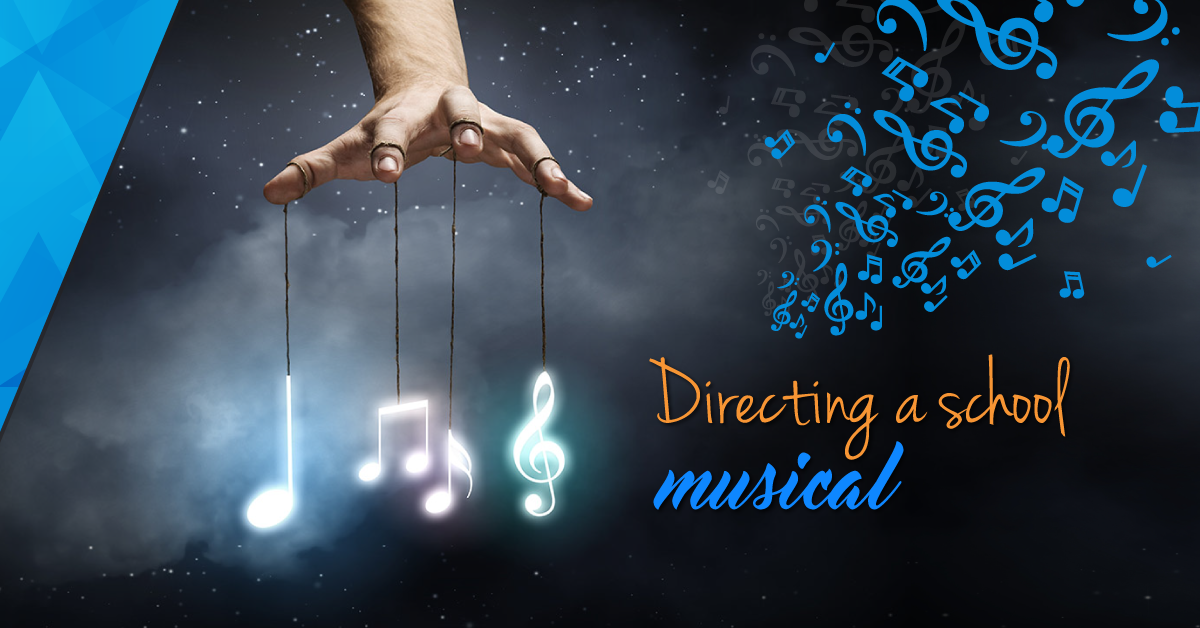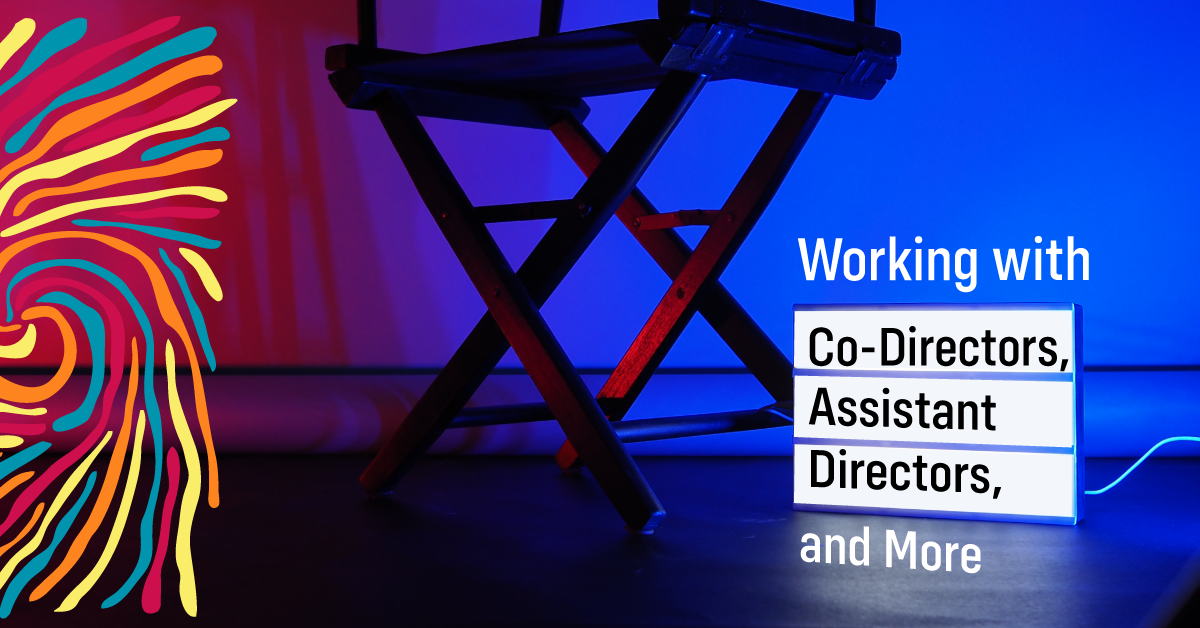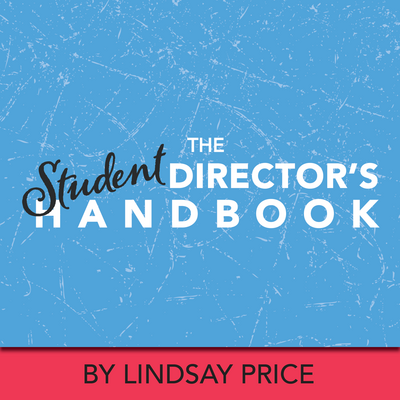Directing Your First Musical (When You Normally Direct Plays)
Congratulations – you are directing your first musical!
You and your students will definitely face some challenges, especially if you normally direct plays. This is not to say that directing a musical is more difficult than directing a play – both are equally challenging, physically and mentally. They are just different. With that, here are ten things to think about and be aware of when directing a musical versus a play.
1. Students will have strong opinions on the show you’ve chosen.
Musicals can be polarizing topics. Rarely do you hear about musicals that are “nice” or “fine” – for most students, musicals tend to fall into “love” or “hate” categories. Students also tend to be passionate and vocal about the musicals they like. For example, if your students are into newer, modern musicals like Heathers, American Idiot, or Bring It On, they may not be as thrilled if you select a classic musical such as The Music Man, Fiddler on the Roof, or Oklahoma (despite the name recognition).
2. Students will want to do musicals that you may not be able to do…or just can’t do, no matter what.
This is a tough one because, as we mentioned, students tend to be passionate about the musicals they want to do. There are many musicals that the amateur rights are not yet available for – so you cannot currently produce shows such as Hamilton, Wicked, Dear Evan Hansen, or SpongeBob Squarepants: The Musical, despite your students’ pleas. Some musicals are incredibly difficult for younger, less experienced performers, such as The Phantom of the Opera (extremely demanding vocally) or Cats (heavy technical dancing), so you’ll have to be very confident in the skills and abilities of your students before selecting a show like those. Shows such as The Last Five Years have too small a cast to be able to do in a high school setting, and some school boards may not approve of productions with mature subject matter such as RENT, Avenue Q, or Spring Awakening. On top of that, many musicals, such as Hairspray, Ragtime, Thoroughly Modern Millie, and In the Heights, are written for performers of a specific race and if you don’t have students of the right ethnicity, you cannot perform those shows.
Do not despair! There are still so many musicals out there for you to explore and discover. With new musicals being released all the time, there will definitely be a gem of a show out there for your students to do – you just may not have found it yet.
3. There can be many different versions of the same musical.
Many theatrical licensing companies produce not only the “official” full-length versions of their shows, but also offer various modified editions of their shows specifically targeted for schools to produce. Take a peek around their websites and you’ll see high school editions, middle school editions, one-act versions, and even dual-language editions of some shows. You will need to do some research and carefully select what version of the show will be best for your students. If they’re available, listen to any music samples on the website and check the vocal ranges to see if they fit the abilities of your students.
Do be aware that high school aged students will occasionally turn up their noses if you select a “junior,” “young performers,” “getting to know,” or “school edition” version of a musical. They might feel that they’re getting a dumbed-down or kiddie version of the show, despite the fact that these shows are especially modified so students can succeed. Generally, the changes include adjusting the original keys of the song to be easier for younger voices, removing some songs or scenes for timing, or adjusting the language to be more appropriate for school audiences (such as removing swear words). If you do decide to choose a different edition, note the differences so you can discuss these changes with your students.
4. Some of your go-to drama students may not audition for a musical.
There are always some incredibly talented, hard-working, and dedicated drama students who will absolutely balk at the idea of singing and dancing onstage. Musicals are not for everyone, but do your best to either convince these students to audition anyway, or if they really do not want to sing and dance, to be involved in another way (stage management, backstage, front of house, etc.). Trying a musical can be a great way for students to discover new skills and talents they didn’t know they had!
5. Everything is more expensive.
Acquiring the rights to produce musicals is more expensive because you’re purchasing both scripts and scores for you and your students, as well as paying for rehearsal tracks and additional staff (musical directors, choreographers, band members, and so on). You will also need an exceptional sound system and probably microphones to ensure your singers are heard over the band or backing tracks.
6. At the beginning of the process, you may not be doing as much as you normally do.
Once casting is complete, you may feel, as director, that you are not doing much during the first month or so of rehearsals. This is especially true if you have a separate musical director and choreographer. With musicals, it is easiest if the songs and dances are learned first so there is more time available to rehearse and review. Certain songs may be blocked instead of choreographed. And, of course, there are scenes to work on that need to be just as good, meaningful, and memorable as the production numbers. Just be aware that the bulk of the work on these parts will come after the majority of the production numbers have been dealt with.
7. Don’t despair the first time your students do a stumble-through.
It is inevitable that the first time your students do a stumble-through of the show, some (if not all) of the production numbers will fall apart. Musicals are incredibly physical, and students have been using their muscle memory for learning the songs and learning their dances. But it is a whole different ball of wax when students are putting the two together for the first time. Either the dancing will be awesome but students will forget to sing, or the singing will be gorgeous but the dancing is a disaster. This doesn’t even touch on students’ acting performances while they are singing and dancing! Keep a positive attitude and point out what did work well. Your students will be aware that they aren’t audience-ready yet…but reassure them that they will get there!
8. You will be reviewing…and reviewing…and reviewing…
Speaking of muscle memory, your students will need to constantly review their lines, choreography, and vocals. Again, this is not to say that being in a musical is more difficult than being in a play – it’s just different. If your students are not experienced in singing and dancing while acting, they will need extra practice. Encourage your students to keep practicing and reviewing at home so you are not spending precious rehearsal minutes having to re-teach choreography and harmonies.
You may wish to assign student dance captains, vocal section leaders, and/or a rehearsal pianist to assist with reviewing and polishing, especially if you are working on something else at the same time, or your musical director and choreographer are not available. Divide and conquer to max out your rehearsal time!
9. The technical needs for rehearsal are different as well.
For rehearsals, you will need a set of backing (karaoke) tracks in the correct key and a sound system of some sort, or a rehearsal pianist (and piano or keyboard). You will also want to record the choreography so you and your students can refer back to it – you will need a digital camera or cell phone with recording capabilities, and a way of sharing the videos, whether that be a private YouTube channel, a Google Classroom, or another platform of a similar nature. Your stage manager may need to take photographs or make drawings of actor placements in production numbers, so students know where they should be standing and who they should be next to at different times. If you are using handheld microphones in the show, be sure to have students practice with something in their hands during rehearsal. They don’t need to have the exact microphone they will be using, but even having a similarly shaped object (like a water bottle) is important for students to practice holding the mic correctly, and figuring out what to do with it when they need to do something physical.
10. Despite the challenges, you will have an absolute blast directing a musical.
Musicals are just another way of telling a story, and that is truly what theatre is – telling a story in different, interesting ways. Musical numbers occur when characters’ emotions are so strong that they can’t just say words – they need to sing about their feelings or express their thoughts through movement. That’s really cool! Your students might be nervous about doing a musical for the first time. Use this opportunity to share your thoughts on the matter too, as this is a new experience for you too. Students need to know that learning happens all the time, and adults are always learning, growing, and making mistakes as well. This will be a wonderful shared experience that you can all look back on together – good luck and have fun!
Related Articles
The Student Director's Handbook
by Lindsay Price
Help students take their show from first audition to opening night with The Student Director’s Handbook. This easy-to-use ebook is full of guidelines, tips and templates designed to help students create a vision, circumvent problems and organize rehearsals on their way to a successful production.
The Rehearsal Companion
by Kerry Hishon
You’ve chosen the play, paid the royalties, done the script analysis, held your auditions, and cast the show. Tomorrow is the first rehearsal. Are you ready? Really ready? The Rehearsal Companion can help!





